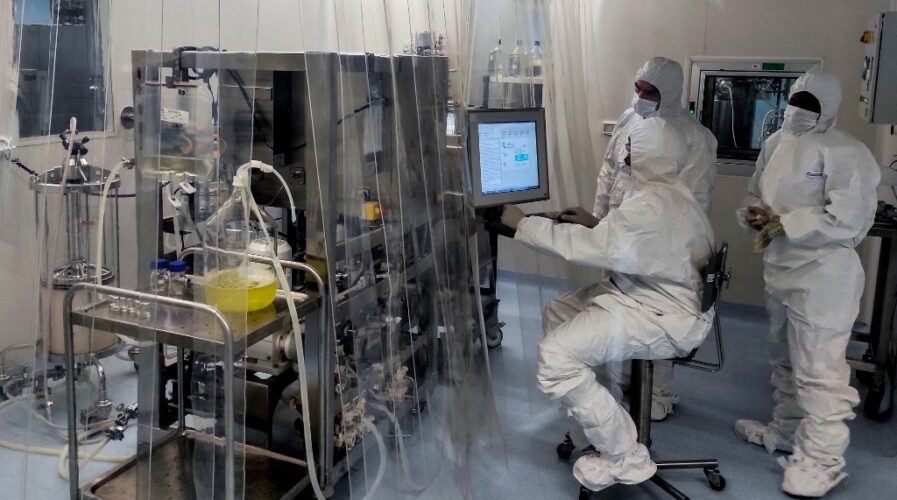
Biotechnology applications are plentiful, and the growing APAC biotech market presents a multitude of opportunities for both public and private sectors (Photo by YAMIL LAGE / AFP)
Biotechnology applications poised for multi-sector growth across APAC
- Biotechnology applications are plentiful, and the growing APAC biotech market presents a multitude of opportunities for both the public and private sectors
Biotechnology was once perceived to be the exclusive domain of nerdy scientists and academicians, seemingly shrouded in arcane scientific jargon and concepts beyond the grasp of the masses. Thankfully, with the proliferation of the internet, it has entered mainstream consciousness as the intersection between science and technology grew wider.
In 2020, partly fueled by the Covid-19 pandemic, the global biotechnology market was valued at a massive US$752B. From manufacturing drugs and vaccines to developing cleaner energy and food production, biotechnology has fundamental applications across multiple sectors critical to the growth of myriad economies around Asia Pacific (APAC).
According to Grand View, the key factors driving this growth include favorable government initiatives, plummeting sequencing prices, growing market demand for synthetic biology, and increasing R&D investments by the public and private sectors.
Biotechnology in APAC
Closer to home, Asia Pacific’s biotech market is expected to expand even faster, with a CAGR of 16.8% up to 2028. This speed can be attributed to improvements in healthcare infrastructure, supportive government policies, clinical trial services, and epidemiological factors.
We also previously wrote about the three big trends shaping the Asian biotechnology scene, and how tech can improve the biotech supply chain, especially in places facing extreme impediments to vaccine delivery.
There is growing interest by foreign companies to work or collaborate closely with local biotechnology players.
Taiwan recently held BIO Digital 2021, the world’s largest biotech partnering and education event. Supported by Taiwanese authorities, it showcased innovative, locally-developed technologies in cancer drugs and cell therapies. This has attracted the attention of Big Pharma players such as Eli Lily, Johnson & Johnson, and Merck, among others.
Advancement of biotechnology applications
Artificial intelligence (AI), data sciences, Internet of Things (IoT) and augmented reality (AR) are just some of the technologies utilized in biotech. They help scientists and practitioners to discover, investigate and develop solutions and products to solve challenges across other sectors.
At the BIO Digital 2021 forum, academician and former Taiwan VP Chien-Jen Chen stressed the importance of using technology, AI and data analytics, as well as smart hospital management to cope with the demands placed on healthcare systems.
APAC biotech market
The APAC region has been seeing quite a number of interesting movements and investments in the biotechnology market for some time. At the Australia-Taiwan Clinical Trial and Biomedical Forum 2020, Australian and Taiwanese leaders highlighted how collaboration between the two countries has had positive and promising impacts commercially and output-wise.
Inspired by Pfizer’s mRNA vaccine for Covid-19, Australia is also considering investing in mRNA-based vaccine manufacturing capabilities in order to be prepared for the next pandemic.
As emerging economies in Southeast Asia (SEA) rapidly grow, so too will the consumption needs of their population. This might push SEA to facilitate the development of biofuels, alternative energy sources that utilizes biotechnology for development and production.
Biofuels can heavily reduce the carbon footprint of nations, and lower their impact on the climate. In 2020, Vietnam, a primarily agrarian, but rapidly growing SEA economy, pledged to develop cleaner, greener, and sustainable smart energy resources under its smart city initiatives.
Overall, the needs of the APAC region across multiple sectors present a prime opportunity for biotech startups and firms to push for growth, to support and develop robust biotech ecosystems across APAC.
READ MORE
- Ethical AI: The renewed importance of safeguarding data and customer privacy in Generative AI applications
- How Japan balances AI-driven opportunities with cybersecurity needs
- Deploying SASE: Benchmarking your approach
- Insurance everywhere all at once: the digital transformation of the APAC insurance industry
- Google parent Alphabet eyes HubSpot: A potential acquisition shaping the future of CRM


